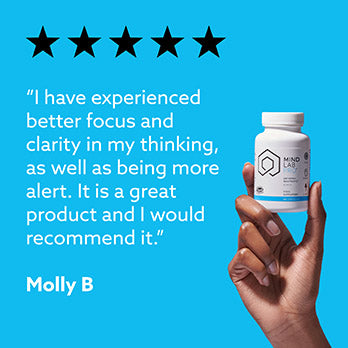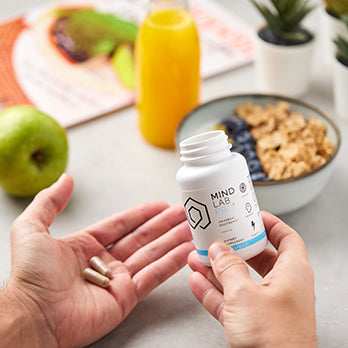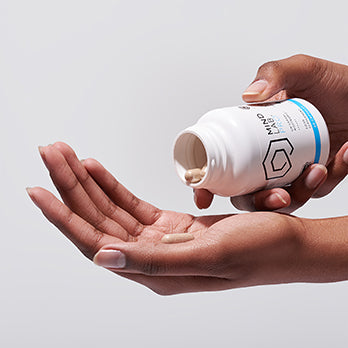The statements on this page have not been evaluated by the Food and Drug Administration. These products are not intended to diagnose, treat, cure, or prevent disease.
The Ingredients.
Mind Lab Pro® v4.0 is the most innovative and effective nootropic formula ever made.
We've partnered with world leaders in nutrition technology. Scouring the globe to source the cleanest, most potent and sustainable ingredients. With no compromise on quality.
Intelligently blending 11 research-backed nootropics - in precise dosages and advanced forms - to complement each other. Making Mind Lab Pro® v4.0 more than the sum of its parts.
We are happy for you to know exactly what goes into every capsule. That's why ALL ingredients and dosages are shown on the label.


Dr. Ramon Velazquez, Ph.D. talks about the formulation strategy behind Mind Lab Pro® v4.0.
Learn about a specific ingredient:
Citicoline 250 mg
Mind Lab Pro®’s citicoline delivers benefits for brain energy, mental performance and memory backed by multiple human clinical trials.
Citicoline has been shown to boost brain cell membrane formation by 26% and brain energy by 13.6%.
Brain Bioactivities:
Citicoline helps energize brain cells, while optimizing the neural electrical impulses that power all thought. Citicoline also helps synthesize phosphatidylcholine (PC), the major phospholipid found in brain cell membranes. In combining brain energy + phospholipid synthesis, citicoline may be uniquely qualified for the intensive task of brain cell regeneration and repair. Citicoline also supports neurotransmitters, including acetylcholine, while supplying brain-protective antioxidant activity.
Potential Nootropic Benefits:
Energizes and enhances mental performance without the crash of stimulants. Citicoline has been shown in human research to promote mood balance, memory, attention, focus and concentration. Long-term, it may help maintain healthy brain function against age-related structural changes and mental decline.

Phosphatidylserine (PS) 100 mg as Sharp PS® Green from Sunflower Lecithin
Mind Lab Pro®'s Sharp Ps® Green is a soy-free, non-GMO, eco-friendly phosphatidylserine derived from sunflower lecithin.
Phospholipids like PS decline in the brain with age, along with many measures of cognitive performance.
Brain Bioactivities:
PS is a phospholipid compound that comprises 15% of the brain's fats. It is concentrated in brain cell membranes, where it helps maintain fluidity, optimizes receptors and promotes neurotransmitters like acetylcholine and dopamine. It supports brain cell energy production by enhancing glucose metabolism. It may increase nerve growth factor (NGF) to support brain cell creation, maintenance and repair. PS also helps immune cells dispose of damaged, toxic brain cells — sparing neighboring brain cells from collateral damage.
Potential Nootropic Benefits:
PS may sharpen memory, slow cognitive decline and promote a positive-minded outlook. It has shown promise for helping elderly subjects with brain degeneration — apparently slowing the progression of memory loss while helping with mood, anxiety, socialization and mental clarity. As a result PS is the only nootropic with an FDA-qualified claim for reducing cognitive decline risk.
Bacopa Monnieri 150 mg
Full-spectrum extract
Mind Lab Pro®'s 24% bacosides Bacopa monnieri supplies the herb's 9 most active nootropic bacoside compounds.
Mind Lab Pro®'s Bacopa monnieri has been shown to enhance delayed recall memory, immediate recall memory and learning in clinical research.
Brain Bioactivities:
Bacopa's active bacosides are antioxidants that enhance other brain antioxidants, including superoxide dismutase (SOD) and glutathione peroxidase (GPx). This synergistic antioxidant activity helps protect brain cells from the age-accelerating effects of free radicals. Bacosides also promote acetylcholine, GABA and serotonin — all brain chemicals tied to focused thinking, clear memory and healthy mood.
Potential Nootropic Benefits:
Bacopa has strong ties to memory performance and a long association with new learning and retention. Human research shows Bacopa may slow the rate of forgetting newly acquired knowledge. Researchers have also suggested it may accelerate mental processing, optimize cognition under stress and promote relaxation.
Organic Lion's Mane Mushroom 500 mg Full-spectrum
Mind Lab Pro's full spectrum organic Lion's Mane (fruit and mycelium) supplies all of the mushroom's active constituents, including brain-boosting hericenones and erinacines.
Lion's Mane Mushroom (Yamabushitake) has been linked to significant cognitive improvements that declined after supplementation stopped.
Brain Bioactivities:
A unique mushroom that supports brain health, Lion's Mane supplies active nootropics called hericenones and erinacines. Clinical research suggests Lion's Mane stimulates Nerve Growth Factor (NGF) production, which may help with neural regeneration and myelin nerve sheath synthesis. Optimized NGF may support brain plasticity for storage of new learning and memories, as well as promoting robust brain cell replication and healthy brain cell membrane function.
Potential Nootropic Benefits:
A double-blind, placebo-controlled trial linked Lion's Mane Mushroom to significant cognitive improvements in adults aged 50-80 with mild cognitive impairment. Clinical trial researchers have also suggested that Lion's Mane may help to maintain mood balance.

Maritime Pine Bark Extract 75 mg
Mind Lab Pro® uses the strongest pine bark form on the market today: Standardized for a minimum of 95% active nootropic proanthocyanidins.
Maritime pine trees adapted to their salty, windswept environment by developing a powerful protective antioxidant complex in their bark.
Brain Bioactivities:
Supplies a potent complex of proanthocyanidin antioxidants that can cross the blood-brain barrier and help to neutralize the damaging effects of toxic free radicals that are concentrated in the brain. Pine bark extract's proanthocyanidins also signal for the release of nitric oxide (NO) — which relaxes blood vessels and increases blood flow to the brain — enhancing delivery of brain-energizing oxygen and glucose. The bark's additional proanthocyanidin bioactivities combine to provide multi-pathway brain regeneration support that has been suggested to help reverse age-related cognitive decline.
Potential Nootropic Benefits:
Pine bark extract's proanthocyanidin compounds are suggested to enhance mental energy, attention, learning and focus in the short-term; as well as maintain memory, mental clarity and brain health in later years.
L-Tyrosine 175 mg as N-Acetyl-L-Tyrosine (NALT)
Mind Lab Pro®'s N-Acetyl-L-Tyrosine is the best form for brain health — easy to absorb and bioavailable — it delivers more nootropic activity than plain Tyrosine.
L-Tyrosine was found to enhance mental performance with greater benefits recorded as tasks progressed from easier (1-BACK) to more difficult (2-BACK).
Brain Bioactivities:
L-Tyrosine is an amino acid compound used to synthesize catecholamine neurotransmitters involved in memory, mood and mental processing – including dopamine, epinephrine, and norepinephrine. Clinical research suggests L-Tyrosine may counter the impact of brain stress; potentially helping to support synthesis of neurotransmitters that are depleted by high-pressure thinking.
Potential Nootropic Benefits:
Human clinical research has suggested L-Tyrosine may help to promote working memory under multitasking conditions and optimize mental performance under high stress, fatigue and sleep deprivation. In addition to its reputation as a nootropic for maintaining mental performance under stress L-Tyrosine has recently drawn academic interest for its nootropic ability to optimize attention and focus.
L-Theanine 100 mg as Suntheanine®
Mind Lab Pro®'s Suntheanine® is a premium form that supplies 100% pure L-Theanine.
Suntheanine® has been shown in human clinical research to enhance alpha brainwaves.
Brain Bioactivities:
L-Theanine helps to increase the activity of alpha brainwaves, which are associated with a state of wakeful relaxation and enhanced creativity. It seems to settle excitable neurotransmitters while promoting calming neurotransmitters like serotonin, dopamine and GABA. L-Theanine has been suggested by researchers to modulate the brain's 'attention circuitry.' It may also protect neurons from damage, potentially helping to maintain clear thinking during the aging process.
Potential Nootropic Benefits:
L-Theanine may instill a state of calm, relaxed tranquillity while simultaneously sharpening attention, alertness and focus. It is used for studying, new learning, creative problem solving, art and other tasks that require quiet contemplation. L-Theanine also helps to reduce the harsh jittery side effects of caffeine.
L-Theanine shows nootropic promise in numerous human clinical trials.
Rhodiola Rosea 50 mg
Mind Lab Pro®'s Rhodiola rosea is standardized for a minimum 3% rosavins and 1% salidrosides; ensuring effective levels of active nootropics in each capsule.
Rhodiola rosea has been linked to dose-dependent mental energy benefits in human clinical research.
Brain Bioactivities:
Rhodiola rosea is believed to stimulate and sustain cognition-critical neurotransmitters — including norepinephrine, dopamine, and serotonin. It may further optimize these neurotransmitters by helping their transport across the blood-brain barrier. Rhodiola rosea has acetylcholine-protective and antioxidant properties that may help with age-related decline. Most notably, Rhodiola rosea strengthens mental resistance to stress by blunting the release of stress hormones including cortisol. Research suggests Rhodiola rosea's nootropic effects begin within 30 minutes and may last for up to six hours.
Potential Nootropic Benefits:
As a herbal Adaptogen, Rhodiola rosea helps strengthen mental + physical stress resistance while supporting brain energy — promoting clear, calm thinking under taxing conditions. Rhodiola rosea is traditionally used to enhance mental processing, memory, learning, attention span, mood and work capacity. It also gained fame as a legal performance-enhancer among Russian Olympic biathletes and powerlifters.

B6 2.5 mg, B9 100 mcg,
B12 7.5 mcg
Mind Lab Pro's NutriGenesis® nature-identical nutrients supply bioavailable forms of B12, B6 and B9 to unlock the full nootropic potential of B-vitamins. B-vitamins are crucial for brain health. Some inferior supplemental forms are not absorbed and utilized effectively.
Mind Lab Pro®'s B6 + B9 + B12 reduces homocysteine — thereby promoting brain chemical synthesis and blood flow to the brain.
Brain Bioactivities:
All B-vitamins contribute to brain health but most research focuses on B6, B9 and B12 — due to their key role in homocysteine metabolism. High homocysteine levels and suboptimal B6, B9 and B12 intake are interconnected and modifiable risk factors for brain degeneration, cerebrovascular concerns, mood imbalance and cognitive decline. Supplemental B6 + B9 + B12 has been shown to help balance homocysteine levels in a healthy range associated with sharp overall mental performance.
Potential Nootropic Benefits:
Mind Lab Pro®'s B6 + B9 + B12 targets homocysteine as a synergistic trio, helping with mental performance concerns related to cognitive decline, brain aging, and poor blood flow to the brain. Vitamins B6 + B9 + B12 have also been shown to promote mood balance, mental energy, information storage and long-range brain health.
B6 + B9 + B12 also supports brain health by:
- Promoting production of monoamines.
- Optimizing chemical conversion and utilization.
- Catalyzing brain-energy metabolism.
- Maintaining the mood-balancing brain protector S-Adenosyl Methionine (SAMe).
- Promoting the production of myelin — the fatty sheath that surrounds and protects all brain cells and nerves.
*NutriGenesis® nature-identical vitamins and minerals are lab-grown via dual-organism cultivation; producing a complex of absorption-enhancing cofactors.
Cited References
-
Citicoline
- Silveri MM et al. Citicoline enhances frontal lobe bioenergetics as measured by phosphorus magnetic resonance spectroscopy. NMR Biomed. 2008; 21(10):1066-75.
- McGlade E. et al., Improved Attentional Performance Following Citicoline Administration in Healthy Adult Women. Food and Nutrition Sciences. 2012;3:769-773.
- Babb SM, Wald LL, Cohen BM, Villafuerte RA, Gruber SA, Yurgelun-Todd DA, Renshaw PF. Chronic citicoline increases phosphodiesters in the brains of healthy older subjects: an in vivo phosphorus magnetic resonance spectroscopy study. Psychopharmacology. 2002;161 (3):248–254.
- Alvarez XA, et al. Citicoline Improves Memory Performance in Elderly Subjects. Methods &Findings in Experimental &Clinical Pharmacology. 19(3):201-10,1997.
- Fioravanti M, Buckley AE. Citicoline (Cognizin) in the treatment of cognitive impairment. Clinical Interventions in Aging. 2006;1(3):247-251.
-
Phosphatidylserine (PS)
- Crook TH, et al. Effects of phosphatidylserine in age-associated memory impairment. Neurology. 1991 May;41(5):644-9.
- Cenacchi T, et al. Cognitive decline in the elderly: a double-blind, placebo-controlled multicenter study on efficacy of phosphatidylserine administration. Aging (Milano). 1993 Apr;5(2):123-33.
- Glade MJ, Smith K. Phosphatidylserine and the human brain. Nutrition. 2015 Jun;31(6):781-786.
- Hirayama S, et al. The effect of phosphatidylserine administration on memory and symptoms of attention-deficit hyperactivity disorder: a randomised, double-blind, placebo-controlled clinical trial. J Hum Nutr Diet. 2013 Mar 17.
- Kato-Kataoka A., et al. Soybean-Derived Phosphatidylserine Improves Memory Function of the Elderly Japanese Subjects with Memory Complaints. J. Clin. Biochem. Nutr., 47, 246–255, November 2010
-
Bacopa monnieri
- Goswami S, Saoji A, Kumar N, Thawani V, Tiwari M, Thawani M. Effect of Bacopa monnieri on Cognitive functions in Alzheimer's disease patients. International Journal of Collaborative Research on Internal Medicine &Public Health. 2011; 3(4):285-293.
- Roodenrys S, et al. Chronic effects of Brahmi (Bacopa monnieri) on human memory. Neuropsychopharmacology. 2002 Aug;27(2):279-81
- Stough C, et al. The chronic effects of an extract of Bacopa monniera (Brahmi) on cognitive function in healthy human subjects. Psychopharmacology (Berl). 2001 Aug;156(4):481-4.
- Shinomol GK, et al. Exploring the role of "Brahmi" (Bocopa monnieri and Centella asiatica) in brain function and therapy. Recent Pat Endocr Metab Immune Drug Discov. 2011 Jan;5(1):33-49.
- Singh HK, Dhawan BN. Neuropsychopharmacological effects of the Ayurvedic nootropic Bacopa monniera Linn. (Brahmi). Indian J Pharmacol 1997;29:S359-S365.
-
Lion's Mane Mushroom
- Wong KH, et al. Neuroregenerative potential of lion's mane mushroom, Hericium erinaceus (Bull.: Fr.) Pers. (higher Basidiomycetes), in the treatment of peripheral nerve injury (review). Int J Med Mushrooms. 2012;14(5):427-46.
- Sabaratnam V, et al. Neuronal Health — Can Culinary and Medicinal Mushrooms Help? J Tradit Complement Med. 2013 Jan-Mar; 3(1): 62–68.
- Mori K, et al. Improving effects of the mushroom Yamabushitake (Hericium erinaceus) on mild cognitive impairment: a double-blind placebo-controlled clinical trial. Phytother Res. 2009 Mar;23(3):367-72. doi: 10.1002/ptr.2634.
- Mori K, et al. Nerve growth factor-inducing activity of Hericium erinaceus in 1321N1 human astrocytoma cells. Biol Pharm Bull. 2008 Sep;31(9):1727-32.
- Ma BJ, et al. TMYC Hericenones and erinacines: stimulators of nerve growth factor (NGF) biosynthesis in Hericium erinaceus. Mycology, Vol. 1, No. 2, June 2010, 92–98.
-
L-Tyrosine
- Thomas JR, et al. Tyrosine improves working memory in a multitasking environment. Pharmacol Biochem Behav. 1999 Nov;64(3):495-500.
- Neri DF, et al. The effects of tyrosine on cognitive performance during extended wakefulness. Aviat Space Environ Med. 1995 Apr;66(4):313-9.
- Deijen JB, et al. Tyrosine improves cognitive performance and reduces blood pressure in cadets after one week of a combat training course. Brain Res Bull. 1999 Jan 15;48(2):203-9.
- Banderet LE, Lieberman HR. Treatment with tyrosine, a neurotransmitter precursor, reduces environmental stress in humans. Brain Res Bull. 1989 Apr;22(4):759-62.
- Colzato LS, et al. Working memory reloaded: tyrosine repletes updating in the N-back task. Front. Behav. Neurosci., 16 December 2013.
-
L-Theanine
- Nobre AC, et al. L-theanine, a natural constituent in tea, and its effect on mental state. Asia Pacific Journal of Clinical Nutrition, 01/2008; 17 Suppl 1:167-8.
- Nathan PJ, et al. The neuropharmacology of L-theanine(N-ethyl-L-glutamine): a possible neuroprotective and cognitive enhancing agent. J Herb Pharmacother. 2006;6(2):21-30.
- Kimura K, et al. L-Theanine reduces psychological and physiological stress responses. Biol Psychol. 2007 Jan;74(1):39-45.
- Gomez-Ramirez M, et al. The deployment of intersensory selective attention: a high-density electrical mapping study of the effects of theanine. Clin Neuropharmacol. 2007 Jan-Feb;30(1):25-38.
- Yamada T. Effects of theanine, r-glutamylethylamide, on neurotransmitter release and its relationship with glutamic acid neurotransmission. Nutr Neurosci. 2005 Aug;8(4):219-26.
-
Rhodiola rosea
- Shevtsov VA, et al. A randomized trial of two different doses of a SHR-5 Rhodiola rosea extract versus placebo and control of capacity for mental work. Phytomedicine. 2003 Mar;10(2-3):95-105.
- Spasov AA, et al. A double-blind, placebo-controlled pilot study of the stimulating and adaptogenic effect of Rhodiola rosea SHR-5 extract on the fatigue of students caused by stress during an examination period with a repeated low-dose regimen. Phytomedicine. 2000 Apr;7(2):85-9.
- Darbinyan V, Kteyan A, Panossian A, et al. Rhodiola rosea in stress induced fatigue — a double blind cross-over study of a standardized extract SHR-5 with a repeated low-dose regimen on the mental performance of healthy physicians during night duty. Phytomedicine 2000;7:365-371.
- Panossian A, Wagner H. Stimulating effect of adaptogens: an overview with particular reference to their efficacy following single dose administration. Phytother Res. 2005;19(10):819–38.
- Perfumi M, Mattioli L. Adaptogenic and central nervous system effects of single doses of 3% rosavin and 1% salidroside Rhodiola rosea L. extract in mice. Phytother Res 2007;21:37-43.
-
Maritime Pine Bark Extract
- Balestreri R, et al. Bagchi D. Free radicals and grape seed proanthocyanidin extract: importance in human health and disease prevention. Toxicology. 2000 Aug 7;148(2-3):187-97.
- Bors W1, Michel C, Stettmaier K. Electron paramagnetic resonance studies of radical species of proanthocyanidins and gallate esters. Arch Biochem Biophys. 2000 Feb 15;374(2):347-55.
- Shi J, et al. Polyphenolics in grape seeds-biochemistry and functionality. J Med Food. 2003 Winter;6(4):291-9.
- Ho GTT, et al. Immunomodulating Activity of Aronia melanocarpa Polyphenols. Int J Mol Sci. 2014 Jul; 15(7): 11626–11636.
- Schmitt CA, Dirsch VM. Modulation of endothelial nitric oxide by plant-derived products. Nitric Oxide. 2009 Sep;21(2):77-91.
- DalBó S, et al. Activation of endothelial nitric oxide synthase by proanthocyanidin-rich fraction from Croton celtidifolius (Euphorbiaceae): involvement of extracellular calcium influx in rat thoracic aorta. J Pharmacol Sci. 2008 Jun;107(2):181-9.
-
Vitamin B6
- Deijen JB, van der Beek EJ, Orlebeke JF, van den Berg H. Vitamin B-6 supplementation in elderly men: effects on mood, memory, performance and mental effort. Psychopharmacology. 1992;109(4):489–496.
- McCarty MF. High-dose pyridoxine as an 'anti-stress' strategy. Med Hypotheses. 2000 May;54(5):803-7.
- National Institutes of Health Office of Dietary Supplements, Vitamin B6 Dietary Supplement Fact Sheet: http://ods.od.nih.gov/factsheets/VitaminB6-HealthProfessional/
-
Vitamin B9
- Young S. Folate and depression—a neglected problem. J Psychiatry Neurosci. 2007 Mar; 32(2): 80–82.
- Durga J, et al. Effect of 3-year folic acid supplementation on cognitive function in older adults in the FACIT trial: a randomised, double blind, controlled trial. Lancet. 2007 Jan 20;369(9557):208-16.
- Homocysteine Lowering Trialists' Collaboration. Lowering blood homocysteine with folic acid based supplements: meta-analysis of randomised trials. BMJ. 1998 Mar 21; 316(7135): 894–898.
-
Vitamin B12
- Schafer JH, Glass TA, Bolla KI, Mintz M, Jedlicka AE, Schwartz BS. Homocysteine and cognitive function in a population-based study of older adults. J Am Geriatr Soc. 2005;53(3):381–388.
- Louwman MW, van Dusseldorp M, van de Vijver FJ, et al. Signs of impaired cognitive function in adolescents with marginal cobalamin status. Am J Clin Nutr. 2000;72(3):762-769.
- Clarke R, Birks J, Nexo E, Ueland PM, Schneede J, Scott J, et al. Low vitamin B-12 status and risk of cognitive decline in older adults. Am J Clin Nutr 2007;86:1384-91.
- Seshadri S, Beiser A, Selhub J, Jacques PF, Rosenberg IH, D'Agostino RB, et al. Plasma homocysteine as a risk factor for dementia and Alzheimer's disease. N Engl J Med 2002;346:476-83.
-
B6, B9 and B12 in Combination
- Agnew-Blais JC. Folate, vitamin B-6, and vitamin B-12 intake and mild cognitive impairment and probable dementia in the Women's Health Initiative Memory Study. J Acad Nutr Diet. 2015 Feb;115(2):231-41.
- Bottiglieri T. Folate, vitamin B₁₂, and S-adenosylmethionine. Psychiatr Clin North Am. 2013 Mar;36(1):1-13.
- Hutto BR. Folate and cobalamin in psychiatric illness. Compr Psychiatry 1997;38:305-14.
- Reynolds E. Vitamin B12, folic acid, and the nervous system. Lancet Neurol. 2006;5:949–960.
- Leahy LG. Vitamin B Supplementation: What's the Right Choice for Your Patients? J Psychosoc Nurs Ment Health Serv. 2017 Jul 1;55(7):7-11.
- De Jager CA, et al. Cognitive and clinical outcomes of homocysteine-lowering B-vitamin treatment in mild cognitive impairment: a randomized controlled trial. Int J Geriatr Psychiatry. 2012 Jun;27(6):592-600.
- Selhub J, et al. B vitamins, homocysteine, and neurocognitive function in the elderly. Am J Clin Nutr. 2000 Feb;71(2):614S-620S.
- Smith AD, Refsum H. Homocysteine, B Vitamins, and Cognitive Impairment. Annu Rev Nutr. 2016 Jul 17;36:211-39
- Kennedy DO. B Vitamins and the Brain: Mechanisms, Dose and Efficacy—A Review. Nutrients. 2016 Feb; 8(2): 68.
Experience the world's smartest brain supplement.
Get Your MLP →Reviewed and recommended.

"I notice mental fatigue is greatly diminished. Better reaction time to the rapids. My anxiety is way down. Better memory, better decision-making skills."
Tony Newman, White Water Rafting Guide.

"The best nootropic I have tried! It has improved my energy and focus, reducing my brain fog. I have more mental stamina and better memory. I highly recommend this supplement."
Chloe Deutscher (@chloebiohacks), Chemical Engineer and Biohacker.

"I was sceptical, but I am impressed. The impact of Mind Lab Pro® on information processing and all forms of memory is undeniable. An exciting innovation in mental performance."
Dr Andrea Utley, Ph.D. Professor at University of Leeds.

"MLP is awesome, I love it. It makes it easy to get all the best nootropics into my daily diet. And the longer you take it the better it gets. Think of it as a multivitamin for the brain."
Nelson Dellis, 5-time USA Memory Champion.

"All 11 nootropics in Mind Lab Pro® are research-backed. For safety and effectiveness. It is the only supplement of its kind with a completely clean formulation and clean capsules."
Dr Ramon Velazquez, Ph.D. Neuroscientist.

"I love the quality of Mind Lab Pro® and the subtle, but effective cognitive performance boost I get from it. No crazy highs and no crashes, just sustainable focus. Delivers every day."
Sara Oberrauch, Neuroscientist.

"Nootropics changed my life. I've enjoyed MLP's benefits since 2015, and I recommend it daily. It's always been - and I believe always will be - the best nootropic stack on the market."
David Tomen, Nootropics Expert, author Head First.

"Mind Lab Pro® gives everyone a pathway to increasing the potential of reaching brain optimization and supporting cognitive health."
Dr Paul Nussbaum, Clinical Neuropsychologist.

"I've seen a huge improvement since taking Mind Lab Pro®. It has really helped with my split-second decision making and mental clarity. I recommend it to all my friends."
Clair Marie, Professional Base Jumper.

"This all-in-one nootropic is one I'm going to highly recommend to those who want to level up in their daily lives - especially those seeking a more focused, clear and cognitive day!"
Justin Crawford, The Routine Project Podcast host.

"I've never been more impressed with a nootropic than with Mind Lab Pro®. I felt a difference the first time I tried it and recommend it to everyone."
Cody Isabel, Neuroscientist.

"With Mind Lab Pro® I notice a difference immediately. I find myself in that 'flow state' much more often, performing at the top of my game."
Brennan Watt, Systems Architect.

"Mind Lab Pro® is a godsend! During competition my concentration has improved. I feel sharper, have an extra edge. I will not be recommending it to my competitors!"
Nigel Short, Chess Grandmaster.

"Within a week I noticed a big difference. I was more alert and focused. My ability to pay attention was off the charts. The only side effect from Mind Lab Pro® is winning!"
David Williams, Professional Poker Player.

"Once I started taking MLP I found I could focus a lot better, an increase in my memory, my ability to problem-solve quickly. The benefits can be applied across all walks of life."
Stephanie Leach, Private Practice Attorney.

"My ability to react faster than my opponents can mean the difference between winning and losing. MLP is scientifically proven to improve reaction speed and the difference after 30-days is noticeable. It's now a permanent part of my nutrition program."
Sophie Alisch, Professional Boxer.
The MLP story.
So far...
Mind Lab Pro® started life in 2015. The year of the 'smart drug'.
We'd heard the hype coming out of Silicon Valley. We'd seen the movie Limitless.
But we were wise to the downsides...
The hangovers. The crashes. The burnout. The dangerous mega doses. The mysterious 'proprietary blends'.
Our mission was to create something superior. Cleaner. Smarter.

Something that matched our limitless ambitions. But with no nasty side effects.
And we've been using it every day since.
#NaturalBrainpower
Get ahead
of the game.
Be first for news, insight, discounts, offers.
MLP® v4.0 has been subjected to rigorous double-blind, placebo-controlled human trials. Conducted by the University of Leeds in the UK.
The first study was conducted independently and published in the Biomedical Journal of Scientific & Technical Research. A peer-reviewed publisher of ground breaking innovation and research.
A second study - funded by Performance Lab® Group (MLP® parent company) focused on memory. It has been peer-reviewed and accepted for publication in Human Psychopharmacology: Clinical and Experimental.
A third study is in preparation stage, which will utilize EEG brain mapping technology.














































